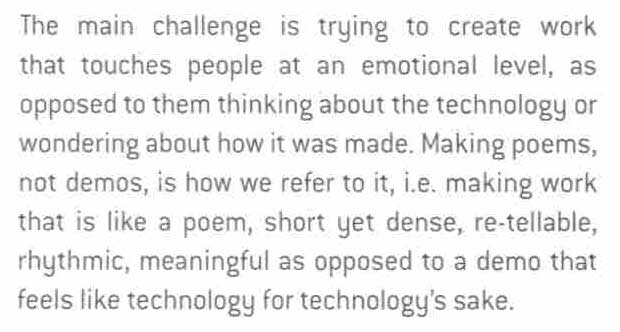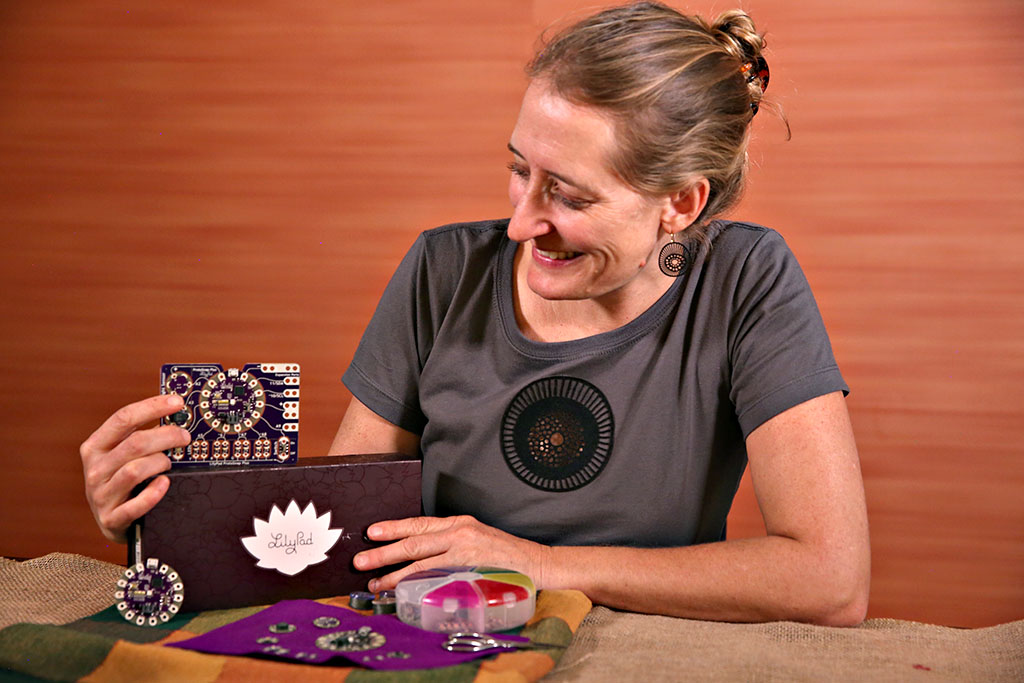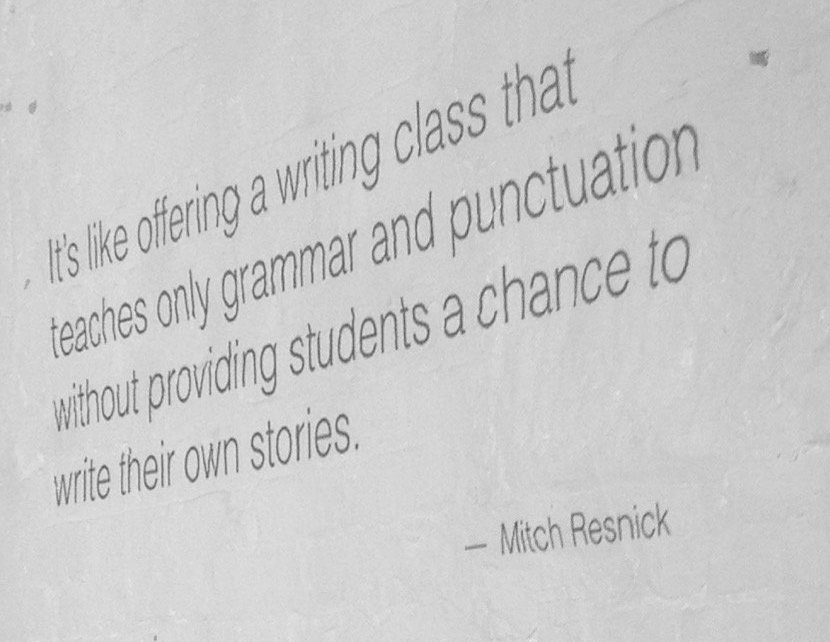Scheduled activities for Friday, August 31, 2018.
Morning Session
- Roll call and introductions
- Syllabus review (key points only) -- 30 minutes maximum
Computational icebreaker activities.
- A/B hidden drawing exercise
- "Beach" by Conditional Design
- "Knots" by Conditional Design
- "Kaleidoscope/Mirroring" by Conditional Design
- Zoom Schwartz Profigliano
Computing, Outside a School of Computer Science
How many of you have taken a computer science course? More than one? As curious and creative people (inventors, artists, designers, musicians, etc.), in what ways have such courses disappointed you?
Designer/educator/engineer, Leah Buechley, has observed that STEM subjects generally fail to educate students who:
- learn concretely (from examples) rather than abstractly (from equations)
- work improvisationally rather than by planning everything in advance
- are interested in creating expressive objects, rather than utilitarian solutions.
Of traditional computer science introductions, educator-innovator Mitch Resnick has remarked, "It's like offering a writing class that teaches only grammar and punctuation without providing students a chance to write their own stories."
This class is intended to address that.
It's possible that STEM education might benefit from the inclusion of arts-oriented pedagogic approaches. But that's not the problem that concerns us in this room. Instead, in a world in which computing now touches every discipline, it should no longer be taken for granted that computing must be taught by computer scientists. Computer Science is a discipline, but programming is a skill (or a tool, or a medium, or better yet, a craft) which has different communities of use with different pedagogic needs.
Coping with with the bimodal classroom is very challenging. Some students have studied programming in CS contexts. But then they say: "I know how to program, but I don't know how to use programming to make art or design".
"Creative coding" describes the growing set of cultural practices by which artists, designers, architects, and poets employ computer programming and custom software as their chosen medium. This burgeoning field has been accelerated by the widespread adoption of open-source arts-engineering toolkits, such as Processing, p5.js, and openFrameworks, into the curricula of hundreds of art and design schools around the world. Created by artists, for artists, these toolkits are specifically oriented to the needs and working styles of cultural practitioners, and have radically democratized software development as a potent mode of creative inquiry.
- Our objective is to make stirring and provocative new forms of culture.
- Our medium is software and electronics.
- We learn codecraft as necessary to execute our ideas.
It Takes a While
 How do you get better at something? The answer is simple: practice. And what is practice? It is playing your scales, again and again, often with errors. This class is designed to give you the "butt in seat time" you need to develop good craft.
How do you get better at something? The answer is simple: practice. And what is practice? It is playing your scales, again and again, often with errors. This class is designed to give you the "butt in seat time" you need to develop good craft.
Themes and Viewings
Themes: Immersivity, generativity, autonomy, transmediality, connectivity.
Projects marked with an (*) were screened in class on 8/31.
Immersivity. We will see different forms of immersion. One form is the feeling we can have of being-in-a-place, as with a landscape painting, Imax movie, or virtual reality. But there is also interactivity, in which a system responds in a unique, open-ended, and tightly coupled way to the actions of its participant -- which is immersively engrossing.
- (*) Scott Snibbe, Boundary Functions, 1998
- (*) Christine Sugrue, Delicate Boundaries, 2007
- (*) Theo Watson & Emily Gobeille, Weather Worlds (2013); Connected Worlds (2015)
- (*) Zachary Lieberman, Más Que la Cara, 2016
- (*) Mouna Andraos & Melissa Mongiat, 21 Balançoires, 2012
- Smart Studio, Brainball, 2007
- Jacolby Satterwhite, New York Close Up, 2013
Generativity. Meta-creation and infinite variation. Things that make things.
- (*) Everest Pipkin, Moth Generator, 2015
- (*) Kate Compton, Puppets, 2017
- (*) Michael Chang, Generative Machines Chrome Experiment
- Matthias Dörfelt, Munching, 2014
- Jessica Rosenkrantz and Jesse Louis-Rosenburg (Nervous System):
Growing a Hyphae Lamp process and results; generative jigsaw puzzles; Cell Cycle custom ring; Kinematics Dress - Christopher Hesse (via Isola et al.), Edges2Cats
- Gabriel Goh, Image Synthesis from Yahoo's open_nsfw, 2017
Autonomy. The illusion of life.
- Karl Sims, Evolved Virtual Creatures, 1994
- Karolina Sobecka & James George, Sniff, 2011
- (*) Bret Watanabe, San Andreas Streaming Deer Cam, 2015-16
- Jacob Tonksi, Balance from Within, 2014
- Madeline Gannon, Mimus, 2016
Transmediality. The transformation and transmutation of signals; information visualization and sonification. Revealing new truths.
- Matt Pyke, Furry & Furry's Posse, 2009
- Arca x Jesse Kanda, Fluid Silhouettes, 2014
- Zach Lieberman et al.: IQ Font (2009); Land Lines (2016)
- Heather Dewey-Hagborg, Stranger Visions, 2011
- (*) Helen Evans & Heiko Hansen (HeHe), Nuage Vert, 2012
- Kanta Horio, Particle, 2008
Connectivity. New modes of communication. New takes on mediatization.
- Maddy Varner, Kardashian Krypt, 2014
- Rafael Lozano Hemmer, Sandbox, 2010
- Dina Kelberman, I'm Google, 2013
- (*) Miranda July, Somebody app, 2014
- Lauren McCarthy, Social Turkers and LAUREN
Some more art presented by Char
Some more art pdf link
Semester Deliverables.
- Re-code & Exercises (Due 9/7)
- Graphic Loop (Due 9/14)
- Clock (Due 9/21)
- Multiuser Environment (Due 9/28)
- Body/Gestural Visualization (Due 10/12)
- Mechatronic Automaton (Due 10/31 & 11/2)
- Generative Book (Due 11/16)
- Virtual Reality (Due 12/7)
Afternoon Session
- A partial introduction to tools used in this class
- Using the course WordPress
- Introduction to p5.js, and resources to help you
- Uploading work to OpenProcessing;
- Embedding OpenProcessing sketches in WP
- Making animated GIFs (See resources here)
- Introduction(s) to media arts
- Discussion of Deliverables-01, due 9/7
Other Logistics & Information
- Access to the STUDIO.
- Missing mornings vs. afternoons.
- Thursday evening work sessions.
- Please don't leave your things, especially laptops.
- Clean up after yourself.
- FRFAF grants
- Thanks to DeepLocal, course sponsors
And
- Our CreativeApplications login
- CLOUDS documentary


